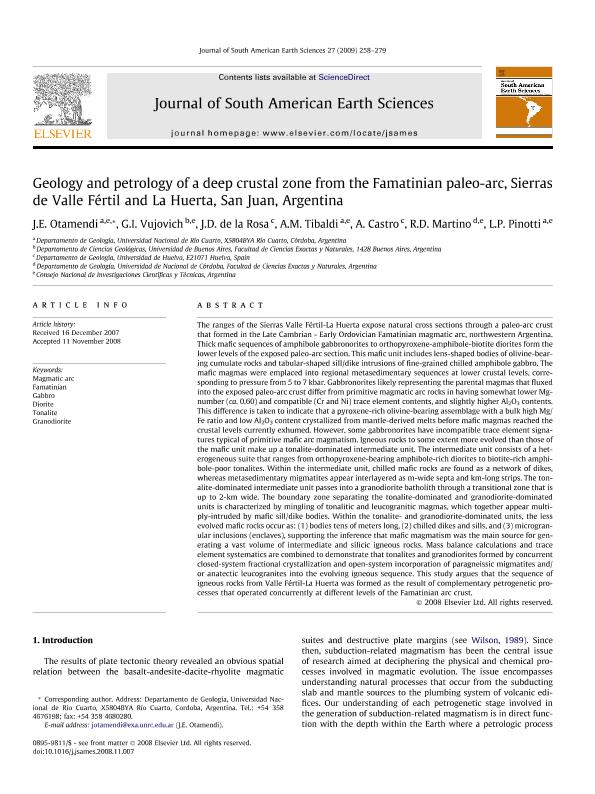Mostrar el registro sencillo del ítem
dc.contributor.author
Otamendi, Juan Enrique

dc.contributor.author
Vujovich, Graciela Irene

dc.contributor.author
de la Rosa, Jesús D.
dc.contributor.author
Tibaldi, Alina María

dc.contributor.author
Castro, Antonio
dc.contributor.author
Martino, Roberto Donato

dc.contributor.author
Pinotti, Lucio Pedro

dc.date.available
2018-08-15T14:14:36Z
dc.date.issued
2009-10
dc.identifier.citation
Otamendi, Juan Enrique; Vujovich, Graciela Irene; de la Rosa, Jesús D.; Tibaldi, Alina María; Castro, Antonio; et al.; Geology and petrology of a deep crustal zone from the Famatinian paleo-arc, Sierras de Valle Fértil and La Huerta, San Juan, Argentina; Pergamon-Elsevier Science Ltd; Journal of South American Earth Sciences; 27; 4; 10-2009; 258-279
dc.identifier.issn
0895-9811
dc.identifier.uri
http://hdl.handle.net/11336/55593
dc.description.abstract
The ranges of the Sierras Valle Fértil-La Huerta expose natural cross sections through a paleo-arc crust that formed in the Late Cambrian - Early Ordovician Famatinian magmatic arc, northwestern Argentina. Thick mafic sequences of amphibole gabbronorites to orthopyroxene-amphibole-biotite diorites form the lower levels of the exposed paleo-arc section. This mafic unit includes lens-shaped bodies of olivine-bearing cumulate rocks and tabular-shaped sill/dike intrusions of fine-grained chilled amphibole gabbro. The mafic magmas were emplaced into regional metasedimentary sequences at lower crustal levels, corresponding to pressure from 5 to 7 kbar. Gabbronorites likely representing the parental magmas that fluxed into the exposed paleo-arc crust differ from primitive magmatic arc rocks in having somewhat lower Mg-number (ca. 0.60) and compatible (Cr and Ni) trace element contents, and slightly higher Al2O3 contents. This difference is taken to indicate that a pyroxene-rich olivine-bearing assemblage with a bulk high Mg/Fe ratio and low Al2O3 content crystallized from mantle-derived melts before mafic magmas reached the crustal levels currently exhumed. However, some gabbronorites have incompatible trace element signatures typical of primitive mafic arc magmatism. Igneous rocks to some extent more evolved than those of the mafic unit make up a tonalite-dominated intermediate unit. The intermediate unit consists of a heterogeneous suite that ranges from orthopyroxene-bearing amphibole-rich diorites to biotite-rich amphibole-poor tonalites. Within the intermediate unit, chilled mafic rocks are found as a network of dikes, whereas metasedimentary migmatites appear interlayered as m-wide septa and km-long strips. The tonalite-dominated intermediate unit passes into a granodiorite batholith through a transitional zone that is up to 2-km wide. The boundary zone separating the tonalite-dominated and granodiorite-dominated units is characterized by mingling of tonalitic and leucogranitic magmas, which together appear multiply-intruded by mafic sill/dike bodies. Within the tonalite- and granodiorite-dominated units, the less evolved mafic rocks occur as: (1) bodies tens of meters long, (2) chilled dikes and sills, and (3) microgranular inclusions (enclaves), supporting the inference that mafic magmatism was the main source for generating a vast volume of intermediate and silicic igneous rocks. Mass balance calculations and trace element systematics are combined to demonstrate that tonalites and granodiorites formed by concurrent closed-system fractional crystallization and open-system incorporation of paragneissic migmatites and/or anatectic leucogranites into the evolving igneous sequence. This study argues that the sequence of igneous rocks from Valle Fértil-La Huerta was formed as the result of complementary petrogenetic processes that operated concurrently at different levels of the Famatinian arc crust.
dc.format
application/pdf
dc.language.iso
eng
dc.publisher
Pergamon-Elsevier Science Ltd

dc.rights
info:eu-repo/semantics/openAccess
dc.rights.uri
https://creativecommons.org/licenses/by-nc-sa/2.5/ar/
dc.subject
DIORITE
dc.subject
FAMATINIAN
dc.subject
GABBRO
dc.subject
GRANODIORITE
dc.subject
MAGMATIC ARC
dc.subject
TONALITE
dc.subject.classification
Meteorología y Ciencias Atmosféricas

dc.subject.classification
Ciencias de la Tierra y relacionadas con el Medio Ambiente

dc.subject.classification
CIENCIAS NATURALES Y EXACTAS

dc.title
Geology and petrology of a deep crustal zone from the Famatinian paleo-arc, Sierras de Valle Fértil and La Huerta, San Juan, Argentina
dc.type
info:eu-repo/semantics/article
dc.type
info:ar-repo/semantics/artículo
dc.type
info:eu-repo/semantics/publishedVersion
dc.date.updated
2018-08-13T17:14:43Z
dc.journal.volume
27
dc.journal.number
4
dc.journal.pagination
258-279
dc.journal.pais
Estados Unidos

dc.description.fil
Fil: Otamendi, Juan Enrique. Universidad Nacional de Río Cuarto. Facultad de Ciencias Exactas, Fisicoquímicas y Naturales. Departamento de Geología; Argentina. Consejo Nacional de Investigaciones Científicas y Técnicas; Argentina
dc.description.fil
Fil: Vujovich, Graciela Irene. Consejo Nacional de Investigaciones Científicas y Técnicas. Oficina de Coordinación Administrativa Ciudad Universitaria. Instituto de Estudios Andinos "Don Pablo Groeber". Universidad de Buenos Aires. Facultad de Ciencias Exactas y Naturales. Instituto de Estudios Andinos "Don Pablo Groeber"; Argentina
dc.description.fil
Fil: de la Rosa, Jesús D.. Universidad de Huelva; España
dc.description.fil
Fil: Tibaldi, Alina María. Universidad Nacional de Río Cuarto. Facultad de Ciencias Exactas, Fisicoquímicas y Naturales. Departamento de Geología; Argentina. Consejo Nacional de Investigaciones Científicas y Técnicas; Argentina
dc.description.fil
Fil: Castro, Antonio. Universidad de Huelva; España
dc.description.fil
Fil: Martino, Roberto Donato. Consejo Nacional de Investigaciones Científicas y Técnicas. Centro Científico Tecnológico Conicet - Córdoba. Centro de Investigaciones en Ciencias de la Tierra. Universidad Nacional de Córdoba. Facultad de Ciencias Exactas Físicas y Naturales. Centro de Investigaciones en Ciencias de la Tierra; Argentina
dc.description.fil
Fil: Pinotti, Lucio Pedro. Universidad Nacional de Río Cuarto. Facultad de Ciencias Exactas, Fisicoquímicas y Naturales. Departamento de Geología; Argentina. Consejo Nacional de Investigaciones Científicas y Técnicas; Argentina
dc.journal.title
Journal of South American Earth Sciences

dc.relation.alternativeid
info:eu-repo/semantics/altIdentifier/url/https://www.sciencedirect.com/science/article/pii/S0895981108001247
dc.relation.alternativeid
info:eu-repo/semantics/altIdentifier/doi/http://dx.doi.org/10.1016/j.jsames.2008.11.007
Archivos asociados
